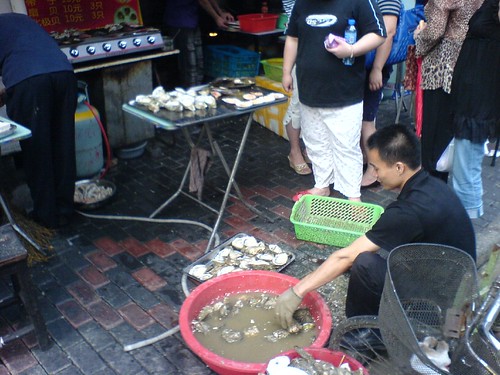23
Jun 2007Misheard in Chinese
My family has a ball with misheard English (“dancing plaid” being a favorite), but a whole new world of hilarious confusion opens up when you switch to a different language. These two were heard the other day:
– 香橙 (“fragrant orange”) mistaken for 香肠 (“sausage”) as an ice cream flavor
– 谢谢光临 (“thank you for coming”) mistaken for 西瓜 (“watermelon”) as a farewell greeting
Given China’s myriad of dialects/topolects/languages and the resulting substandard varieties of Mandarin, one can expect this kind of thing to be quite commonplace in the PRC. The miscommunications seem especially bizarre when you translate them into English. Have you heard any good ones in Chinese?
21
Jun 2007Thesis Proposal in China
Today I had to officially submit my masters thesis proposal to a panel of professors at East China Normal University. In Chinese, the verb for going through this process is 开题. When you propose your thesis topic, you have to give each professor on the panel a copy of your proposal, or 开题报告. Then you summarize what you’d like to do in your thesis, and ask the professors any questions, if you’d like. The professors ask you questions about the scope of your thesis, controlling certain variables, theoretical basis, how your thesis will differ from existing research, etc. If all goes well, they will give you a few recommendations, approve the topic, then sign some paperwork and it’s all over. (I wish I could compare the process to an American version, but I’ve only ever been a graduate student in China, so I can’t.)
My thesis proposal was approved. I still have to revise the scope of my experiment somewhat, but I’m going to be studying some of the problems that North Americans have with the tones of Mandarin Chinese as upper elementary level exchange students in China.
In preliminary research on my topic, the most relevant and interesting paper I came across was a research paper by Dr. Qinghai Chen, who is currently a professor at the University of Michigan. Dr. Chen’s doctoral dissertation was done at Brigham Young University in 2000, entitled “Analysis of Mandarin Tonal Errors in Connected Speech by English-Speaking American Adult Learners: A Study at and Above the Word Level.”
The part of the abstract that intrigues me most:
> Findings at and above the word level jointly led to a summary of tonal error patterns, a discussion of relevant learner factors, an acquisition order of tonal contrasts, a set of criteria for better tones, and pertinent pedagogical suggestions.
So far I have been unable to get a full copy of the dissertation. I have contacted Dr. Chen and am awaiting his reply, but I’m afraid he might be on vacation or something. If anyone has an electronic copy of this paper, I would greatly appreciate the help!
Update: I got several e-mails offering help in acquiring Dr. Chen’s doctoral dissertation, including one with a PDF copy of exactly what I’m looking for (and within 12 hours of publishing this post). You readers are awesome! Thank you.
19
Jun 2007Back from Beijing
Just got back from Beijing. I have more thoughts on that city, for those that can stand them, but I’ll be posting them in a few days. In the meantime, you can read Brendan’s account of my little meetup with him.
16
Jun 20074-Man VIP Seating
Now that I’m a “Shanghai snob,” I had to laugh at Hangzhou’s East Train Station waiting room VIP seating:
14
Jun 2007West Lake No. 1
I love stylized Chinese characters.
It says 西湖一號 (West Lake No. 1). This is a good example of mainland Chinese designers using traditional Chinese characters for artistic effect (號 rather than 号).
Taken next to West Lake in Hangzhou.
12
Jun 2007Access Flickr in the PRC
There’s a new addon for Firefox that gets around the recent Flickr block. Apparently all it affects is Flickr photos. Get it here:
> http://addons.mozilla.org/en-US/firefox/addon/4286
I’m using it and it works great. The only downside of using this is that I won’t know when Flickr becomes unblocked…
[Source]10
Jun 2007100% Married
As of yesterday, I am 100% married. I had been “half married” for a year. Honestly, I think it was great to do it this way. We had plenty of time to get used to the idea of being married. I’m usually for jumping into the deep end rather than slowly wading into the shallow end, but in this case I liked it.
My whole family is still here in Shanghai for another week, so expect light posting.
08
Jun 2007More Trash Means More Jobs
After eating all Chinese food for about a week, my family was delighted to stop into Starbucks in Hangzhou. (Funny how a familiar corporate logo can engender feelings of fondness.) We had the following conversation:
> Me: You don’t need to gather up the trash. They’ll clear the table when we leave.
> Mom: But the trash can is just right there.
> Me: Still, you don’t need to do it. It’s their job. You don’t want to take away their job, do you?
> Mom: I’m just going to throw it away.
> Me: If everyone did that, people would be out of jobs. To ensure these people’s jobs, I think we should give them more work by throwing all our trash on he ground.
(Yeah, my mom learned to ignore my comments long ago.)
08
Jun 2007HACKED!
My web hosting provider, DreamHost, got hacked recently. In an e-mail to me, they wrote:
> We have detected what appears to be the exploit of a number of accounts belonging to DreamHost customers, and it appears that your account was one of those affected.
> We’re still working to determine how this occurred, but it appears that a 3rd party found a way to obtain the password information associated with approximately 3,500 separate FTP accounts and has used that information to append data to the index files of customer sites using automated scripts (primarily for search engine optimization purposes).
> Our records indicate that only roughly 20% of the accounts accessed – less than 0.15% of the total accounts that we host – actually had any changes made to them. Most accounts were untouched.
So yes, I was affected. So was Brendan at Bokane.org. Apparently what the hackers did on my websites was replace every index.php file with their own copy, which just linked to all kinds of ad sites, and apparently even contained some viruses (probably only an issue for IE users). Anyway, the whole thing is very annoying, but easy enough to undo. (Luckily I do have backups of those files.)
The blog and main page are back to normal, and other pages should be returning to normal in the next few days.
P.S. Has anyone else noticed that a lot of Flickr’s image servers are all of a sudden being blocked in China? Not all Flickr images are blocked, but many are now. For instance, I can no longer see the Chinese doughnut image from my last entry.
06
Jun 2007Chinese Doughnuts
One food that foreigners miss while in China is doughnuts. Sure, Shanghai has its “Mister Donut” shop, but those small, hard doughnuts never impressed me. Then there are those that call Chinese youtiao (fried bread-like sticks) a “Chinese doughnut,” but I find that very suggestion laughable. A proper doughnut is a whole different animal. I was therefore pleasantly surprised to stumble across these yesterday near West Lake in Hangzhou:
Fresh, soft, and dusted in powdered sugar. No glaze, and they were a bit heavy (not exactly Krispy Kreme), but they had the familiar taste of the authentic doughnut. The best part: only 1 RMB each.
I hope these make it to Shanghai! Has anyone else out there had true doughnut experiences in China? (I’m much more interested in this kind, pioneered by locals and sold cheaply, than in some kind of ridiculous luxury import scheme.)
01
Jun 2007Visiting Shanghai
My whole family is currently visiting me in Shanghai. I’ve got a list of great restaurants to take them to, and a few other fun places as well. We’ll also go to Beijing. I was just wondering if anyone out there can recommend things in Shanghai that appeals to 60ish parent-types?
Specific recommendations as well as links to relevant blog entries or whatever are all welcome. Thanks in advance!
Update: I’ve gotten some helpful suggestions, and I appreciate that. I’m taking them to Hangzhou very soon. This means that (1) I won’t be posting anything else for a few days, and (2) there’s more time to keep those suggestions coming! (Hangzhou is so much easier to be a tourist in than Shanghai… I feel like Shanghai is mostly just eating and shopping.)
29
May 2007The Classiest Street Food
Wandering around Shanghai the other day, I stumbled upon this street food:
Yes, those are raw oysters. I’m hoping the thing behind them is for cooking them, but I didn’t find out exactly how they were supposed to be eaten.
Here they are being prepared:
I think it’s safe to say that my personal quest for “surest way to get food poisoning ever” has finally come to an end.
27
May 2007Ice Bar Details
Recently the Shanghai Daily ran a story about a new Absolut Ice Bar being constructed in Shanghai. Ice bars are fun, so I wanted more details. Unfortunately, the article didn’t tell either the opening date or the planned location.
Yesterday walking around Shanghai I sort of found the answers to my questions. Here’s how “open” it is:
And here’s the location:
It’s right next to 138 Huaihai Middle Road (淮海中路138号). Maybe it’ll be done by mid-summer?
25
May 2007On Accents and Perceived Fluency
I’ve known for a while that for the highest perceived fluency, a foreigner should aim for a Beijing accent. That’s what Dashan did, and I’ve witnessed many times that a Beijing accent just impresses Chinese people more (especially outside of Beijing). It never had any appeal for me, though.
What I have noticed, though, is that as one’s accent improves, it can move through various levels of perceived fluency, seemingly imitating some of Greater China’s regional accents. I’ve actually heard Chinese people make some of these comments, and I cobbled together this rough guide to what the various comments mean.
| When they say you sound like a… | they mean that… |
| 老外 (foreigner) |
your Chinese is bad. |
| 外国人 (foreigner) |
your Chinese is bad (but they tried just a little to be polite). |
| 新疆人 (Xinjiang person) |
your Chinese is functional, but your tones are a mess. |
| 山东人 (Shandong person) |
your Chinese is a bit better than a 新疆人’s. |
| 四川人 (Sichuan person) |
your Chinese is a bit better than a 山东人’s. |
| 香港人 (Hong Kong person) |
your Chinese is pretty good, but sounds a little funny. |
| 南方人 (Southerner) |
your Chinese is good, but some consonants are non-standard. |
| 台湾人 (Taiwanese) |
your Chinese not only sounds like a 南方人’s, but also a girl’s. (This is not so bad if you happen to be a girl.) |
| 东北人 (Northeasterner) |
your Chinese is good, but not quite up to 北京人 levels. |
| 北京人 (Beijinger) |
your Chinese is really amazing. |
These impressions are sure to vary somewhat from region to region (and yes, they are unfair, subjective generalizations). Anything I missed?
22
May 2007The Light that Kills Mosquitoes
Tonight I went out to pick up a few items. I wanted to get some drinks and a bug zapper light. (Summer is slowly seeping into Shanghai in all its steamy unpleasantness, and with it comes the skeeters.)
The grocery store was already closed, so I turned to one of the little hardware/general shops that line the road.
> Me: 有杀蚊子的灯吗? (Do you have lights that kills mosquitoes?)
> Shopkeeper: 么哇某某灯?没有。 (Something-something light? Nope.)
> Me: 叫什么? (What’s it called?)
> Shopkeeper: 灭蚊灯。 (Bug zapper.)
> Me: 哦,谢谢啊。 (Oh. Thanks!)
> Shopkeeper: 不谢。 (No prob.)
The word doesn’t have the refined feel of the word for mosquito coil, 蚊香 [literally, “mosquito incense”], but at at least it’s easy to understand. Literally, 灭蚊灯 means “extinguish mosquitoes light.”
So I didn’t get my bug zapper light, but I got a new word. Armed with the new vocabulary, I quickly asked three other shops. None of them had any “extinguish mosquitoes lights” either. I failed my mission, but I had a new word cemented in my memory.
It made me nostalgic… I used to learn so many new vocabulary words that way, but I only just realized how long it’s been. Carrefour just isn’t as fun.
Note: If you’re reading this via RSS feed, then my experimental “fuzzy response” CSS effect (on the shopkeeper’s initial reply) probably didn’t carry over. Visit the site to see what you’re supposed to.
21
May 2007Barber Shop Antics
If you were one of the low-paid employees of a Chinese barber shop, would you go along with having to learn a dance routine and do it in public right in front of the shop? That’s apparently what I witnessed from my taxi yesterday:
Speaking of barber shops, Ben Ross has been working in a Chinese barber shop. No, it’s not some kind of weird role created just for a foreigner; he’s doing exactly the same work that any young Chinese guy would. The project has taken over his life and his blog. The posts thus far are:
– My new job…in a Barbershop!
– First day at the Barbershop
– Day 2: Exhausted
– I may work in a barbershop, but I’m not a barber.
– Johnny Be Good
– The Huan Ying Guang Lin Meeting
– The Year of the (Guinea) Pig
– Snakes in a Barbershop
– I get highlighted!
– Where are all the women?
– Miscellaneous Updates
– Employee BBQ!!!
– White people with big shelves
– Facts and Figures: Hours per year
– Corruption in the Barber Shop
I know it’s a little abnormal to post so many links to one blog all in one post, but I think what Ben is doing is worthy of all the attention it gets. To me, this kind of thing is the epitome of interesting blogging on China.
I actually thought of doing the same thing before, but I never had the time to go through with it. A friend of mine (let’s call him “J-L”) actually did the same thing once. J-L had a hard time convincing a Chinese restaurant to hire him (the manager couldn’t understand why he would want to do such a lowly job), but he finally got a position in the kitchen cutting vegetables all day… until they fired him for being too slow. So Ben’s blog series is the first time I’ve seen it done and documented so well. I have a lot of respect for Ben for sticking to it for so long (and not getting fired).
When I thought about doing something similar, I initially considered somewhere like KFC or McDonalds (OK, I’m a sucker for irony), but I guess it would be hard to work at one of those places without getting special treatment or promoted to a special position. A barber shop is somewhere I’d definitely not want to work.
16
May 2007Grammaticalization: Articles for Chinese?
This week in grad school class about Chinese grammar, we covered the topic of grammaticalization. Of interest to me was one paper in which the author made a case for the demonstrative pronoun 这 beginning to take on the role of definite article in Beijing dialect. In this usage, 这 is pronounced “zhe” (neutral tone). The author also examined 那, and the same thing is not happening.
This made me think of English. We have the demonstrative pronouns “this, “that,” “these,” and “those.” Our definite article is “the.” Might “the” have evolved the same way? It seems almost the same… Just as 这 goes from fourth tone to neutral in the change, “this” perhaps lost its final consonant and the vowel was reduced to a schwa. Or actually, “the” could just be capturing the initial consonant sound of all four of those demonstrative pronouns. Does anyone know anything about the historical grammaticalization of English? I Googled it but didn’t find much.
The paper also talked about the development of an indefinite article (like “a” or “an” in English). The author explains that in Beijing dialect, 一个 is often shortened to 一, but is pronounced “yí” (second tone) rather than “yī” (first tone). It stays second tone because in 一个 the 一 has to be second tone due to Mandarin’s tone changes for 一. It’s not normal for that tone change to stick if you remove the reason for it, though. The author says this tone change sticks no matter what noun precedes it, and gives the examples of 一狮子, 一熟人, 一老外, 一耗子 (which demonstrate that the second tone sticks no matter which of the four tones follows it).
So it makes you wonder… if this trend in Beijing dialect becomes a rule, will it make it into Mandarin as a whole? How soon might students of Chinese have to learn the Chinese definite and indefinite articles?
The actual article goes into 11 pages of examples, as well as semantic and syntactic analysis. If you’re interested, it’s called 指示词“这”和“那”在北京话中的语法化 and it’s by 方梅, published in 2002.
13
May 2007How I Learned Chinese (part 2)
So I’ve already explained how I arrived in China with a decent foundation in grammar and characters, but some problems with my pronunciation. So what happened next?
Well, first I should explain my initial attitude. Two years previously I had had a great experience studying Japanese in Osaka. I enjoyed the process of learning a new language in a foreign society so much that doing it all over again had become central to my post-graduation plan. So when I arrived in Hangzhou I was very eager to get out there and try out my Chinese.
I immediately ran into two major problems. Overcoming those two problems were key to my early progress in China.
Problem 1: Pronunciation
OK, so I already knew when I arrived that my pronunciation wasn’t great. I knew I got tones wrong sometimes. I knew I had been fudging Mandarin’s “x” and “q” consonants for two years. But I wasn’t prepared for the end result: people frequently just plain didn’t understand me. At all.
At first I tried to downplay it with “that guy was just not used to talking to foreigners” or “it must be my Beijing-centric pronunciation.” That attitude didn’t really help me. I got through the denial stage pretty quickly and ended up with a firm conviction: the problem is me. I then gathered all my resolve and launched into a relentless campaign of self-criticism. Whenever I was not understood, I made a mental note of which words it was I seemed to be having trouble with. When people repeated what I said, I paid especially close attention, because they would often be correcting my pronunciation rather than merely confirming. I was totally focused on every word* that came out of native speakers’ mouths.
[*I have to make a note here: I initially lived in Hangzhou, a city in the southern province of Zhejiang. Southerners are notorious for their substandard pronunciation of the “sh,” “ch,” and “zh” consonants, but I knew this going in. It made listening comprehension very frustrating at first, but once I developed an ear for it, it became a huge strength. Having all that confusing input also made it absolutely imperative for me to look up in a dictionary every new word I picked up to confirm its correct pronunciation.]With the help of a Chinese friend and a lot of concerted effort, I was able to finally figure out how to pronounce “x,” “q,” and “j” consonants after about a month of living in China. I also hired a qualified tutor (she had a masters in teaching Chinese) to help me, and under her tutelage I finally got the “yu” sound down. The “r” sound eluded me for longer, but with focused observation and a self-critical attitude, I conquered it as well.
Tones continued to be a major problem for a long time, but they got better with time. The important thing was that I was convinced from my early experiences in China that they were very important and couldn’t be ignored. I was constantly looking up words in my dictionary, frequently just to check the tones. Once you’ve looked up a word about twenty times to check the tones, it usually finally sticks. Certain tone pairs gave me problems for a while, but when I began really focusing on tone pairs, I was able to overcome them as well.
Problem 2: Practice
One great thing about modern China is that foreigners are still rare enough in most places that it’s not hard to find someone curious to talk to you. I soon learned, however, that this does not necessarily mean that they want to talk to me in Chinese. I was meeting people at every turn that just wanted to talk to me in English. This was very frustrating. On top of that, even if their spoken English was pretty bad, my Mandarin was worse. So if our goal was actual communication, speaking in English was much more effective.
This did not deter me. I saw it as a challenge. What I had observed was that the people that wanted to practice English the most were young people, typically university students. Since they were about my own age and had a lot of free time, they seemed like the ideal conversation partners. However, I eventually had to make a decision to reject them categorically because they were nearly all obsessed with improving their English and I was in a hurry to improve my Chinese. It may sound cold, but I didn’t leave my friends and family on the other side of the world to improve strangers’ English. Teaching English was my job and I was dedicated to it, but in my free time I absolutely had to be practicing Chinese. I decided that language exchanges made no sense; I was surrounded by millions of Chinese. I was sure I could find Chinese people that would be willing to do an old-fashioned “exchange” of ideas and information–entirely in Chinese. And if unwillingness to communicate with me in Chinese was the thorn in my side, then inability to communicate with me in English could be my salvation.
So who did I turn to? Well, I reasoned that with my Chinese as bad as it was, if the conversation was going to be all in Chinese I would have to find someone very patient. That’s not an easy trait to spot. But what I realized is that people can be motivated to be patient if they’re extremely bored. So I set my sights on people who (1) were not in an age range or social status that were likely to know (or want to know) English, and (2) had a job which left them stuck in one place with no one to talk to… bored people.
So my first Chinese friends were the guards at the apartment complex where I worked. Those guys were aged probably 30-45, and sat in a guardhouse next to the gate all day long. Their only daytime duties seemed to be opening the gate for the occasional car and handing out residents’ newspapers. There was always one of them in there, just reading a newspaper or sipping his tea and staring off into space. I noticed that they seemed very interested in me. So I took the plunge.
It was weird and awkward to go into the guardhouse that first time and just start talking in my broken Chinese. I could barely form a coherent sentence. But when I made it clear that I was just being friendly, the guard, in typical Chinese fashion, insisted that I sit down while he poured me some tea. That’s how it began.
I started spending about an hour in the guardhouse every evening. I would bring my notebook and my dictionary with me. It wasn’t because I was so studious that I wanted to write down everything I learned; those were essential tools for our communication! Sometimes I would be looking up three words in the guard’s simple five word sentence. Other times I would need them to write down a word so that I could guess at the meaning and look it up later. To be honest, it was kind of painful. I kept the chats to about an hour, because it was all that my poor brain could take. I left every session absolutely exhausted.
Chatting with the guards was a very humbling experience, but it was the kickstart my Chinese needed. I felt awkward every time I went in to initiate communication, but I was making progress, and those guys really wanted to talk to me. They loved my visits. Their faces would light up at the opportunity to communicate (however excruciating the process) with a real live foreigner.
I later moved from that apartment complex and didn’t get to see my guard friends as often, but I had gained important confirmation: I didn’t have to “buy” Chinese practice time with English. There were people that wanted to talk to me in Chinese–regardless of my level–if I would just seek them out.
From there my practice went in a lot of directions. I started frequently chatting with a young couple that ran a tiny burger joint down the street. They were only busy at mealtimes and had almost nothing to do the rest of the time. The more people I talked to, the more I improved, and the more I improved, the more different groups of people I felt comfortable talking to. I didn’t avoid the college kids forever; I found a way around the insistence on English. I found that by chatting online in Chinese I could focus on grammar and vocabulary without the pronunciation pressure. My goal was simple: see how long I could chat with someone without them catching on that I wasn’t Chinese.
My first year and a half I worked really hard at Chinese. I had no foreign friends, and my dictionary was my constant companion. At the end of that time, my Chinese was functional for the basics. I had made it to the “I’m speaking Chinese!” Stage.
Time travel 5 years to the future for How I Learned Chinese (part 3)!
09
May 2007May Internet Slowdown
Is it my imagination, or has internet speed in Shanghai (for international websites) been extremely slow starting yesterday? Is it just Shanghai, or the rest of China too?
(Did I miss a news story?)
May 10 Update: It seems to be back to normal again.
May 10 Update #2: OK, just kidding. The internet here is crap again.
06
May 2007How I Learned Chinese (part 1)
Over the years I’ve gotten quite a few questions about this, so I thought I’d write a series of entries that explain everything. I’d like to stress from the beginning that the method I used is not going to work for everybody. It’s not “the right method.” It’s simply the method I used. This post will focus on my formal education in the States.
I decided to start learning Chinese while I was an exchange student in Japan. When I went to Japan I was still a microbiology major. I had to write an essay about why I wanted to go to Japan in order to get into the program, and among my reasons I listed all the advances the Japanese were making in biotechnology, which led to my belief that knowing Japanese would help me as a scientist. It was while I was in Japan that I decided I would abandon microbiology altogether to go the linguistics route. At that point I made a lot of practical decisions which would set the course that I’m still on now.
I don’t remember what all the stimuli were for the decisions I made that night, but I recall vividly the intense excitement for my new course of action. That high made me surer than I’d ever been about what career path I wanted to take. Some of the things I decided that night were:
1. I would change my major from microbiology to Japanese.
2. I would minor in Teaching English to Speakers of Other Languages.
4. I would also minor in Latin American Studies.
3. I would take Chinese classes on the side.
5. I would go to China after I graduated to learn Chinese and teach English.
My choices were all very pragmatic. I didn’t major in linguistics because after I got back from Japan I wouldn’t have time to earn all the credits I needed to graduate in four years. I wanted to graduate in four years because my scholarships paid for everything but they only lasted four years. I was also eager to get to China after graduation.
I minored in TESOL so that I would know what I was doing as a teacher in China. I started working as an “interaction leader” at the English Language Institute at the University of Florida, and I loved it. I loved all the intercultural exchange, I loved being a part of other people’s learning processes, and I loved the linguistics of it all.
I minored in Latin American Studies because (1) I didn’t want to lose the four years of Spanish I had in high school, (2) I wanted to continue taking Spanish courses, and this made them count towards something, and (3) I wanted to study in Mexico, and this minor justified that expense.
Anyway, my third year at UF I started studying Chinese formally from scratch. I was 20 years old. I started with traditional characters, but after the first semester decided they were a pain in the ass and a totally unnecessary one since I was planning on going to the PRC after graduation.
I remember clearly how hard I struggled with tones my first semester. We were supposed to go to the language lab and work on the tones, but I never did. I was struggling, but it was clear that I wasn’t the worst off in the class, so I didn’t put in the extra effort. I was of the opinion that it would get easier with time, so I didn’t sweat it too much. I could still make A’s in the class with mediocre tones.
The first semester our instructor gave us a series of “tone quizzes” to force us to work on the tones. She did this by reciting a number of Chinese poems and making us put the tone marks on the syllables. We had no idea what the poems meant; they were just sounds to us at that point. I tried really hard at learning to identify the tones but ultimately sucked at it. I passed the quizzes with flying colors by identifying tonal patterns in the poetry and memorizing a few “marker” syllables to identify which patterns went with which poems.
My first year of Chinese study at UF was pretty unremarkable. We had the typical character-writing homework and classroom exercises. Now that I think about it, my teacher tried hard to get us doing communicative exercises in class. We often did pair work, or exercises where each student only had one piece of information and had to find the other student with the other piece of information by using Chinese. These kinds of exercises became increasingly difficult to pull off in the classroom with each semester, however, as the Chinese class attrition rate is about 50% from semester to semester.
The second year of Chinese class we started using Integrated Chinese. I rather liked it as a textbook. I found the vocabulary useful and the grammar explanations effective. This is the book I really focused on before going to China. I didn’t have time to take Chinese class my last semester, but I was able to keep studying Integrated Chinese. [Note: I think there are now better materials for studying Chinese available, but I didn’t have those at the time.]
I think I got a pretty good theoretical foundation in three semesters of Chinese at UF. My grammar and character knowledge (both simplified and traditional) were pretty solid. What was not solid was my pronunciation. I knew I didn’t have control over my tones, and that my pronunciation of pinyin q, x, j and r were not correct (more on this). I learned enough to pass my classes with A’s, but that didn’t include accurate pronunciation.
The important thing was that I knew before I went to China what my weaknesses were. I didn’t realize how profoundly those weaknesses would impact my attempts at communication. But more on that in the next post in this series.









